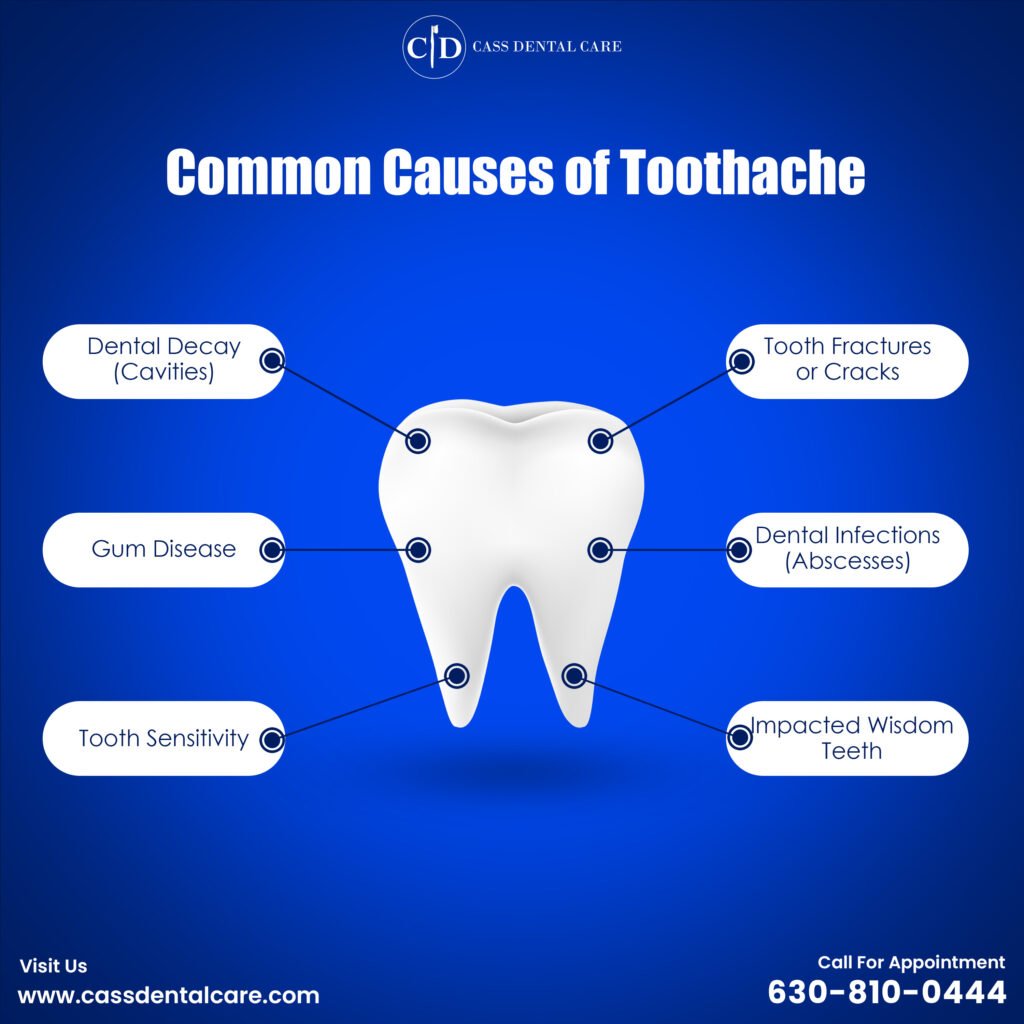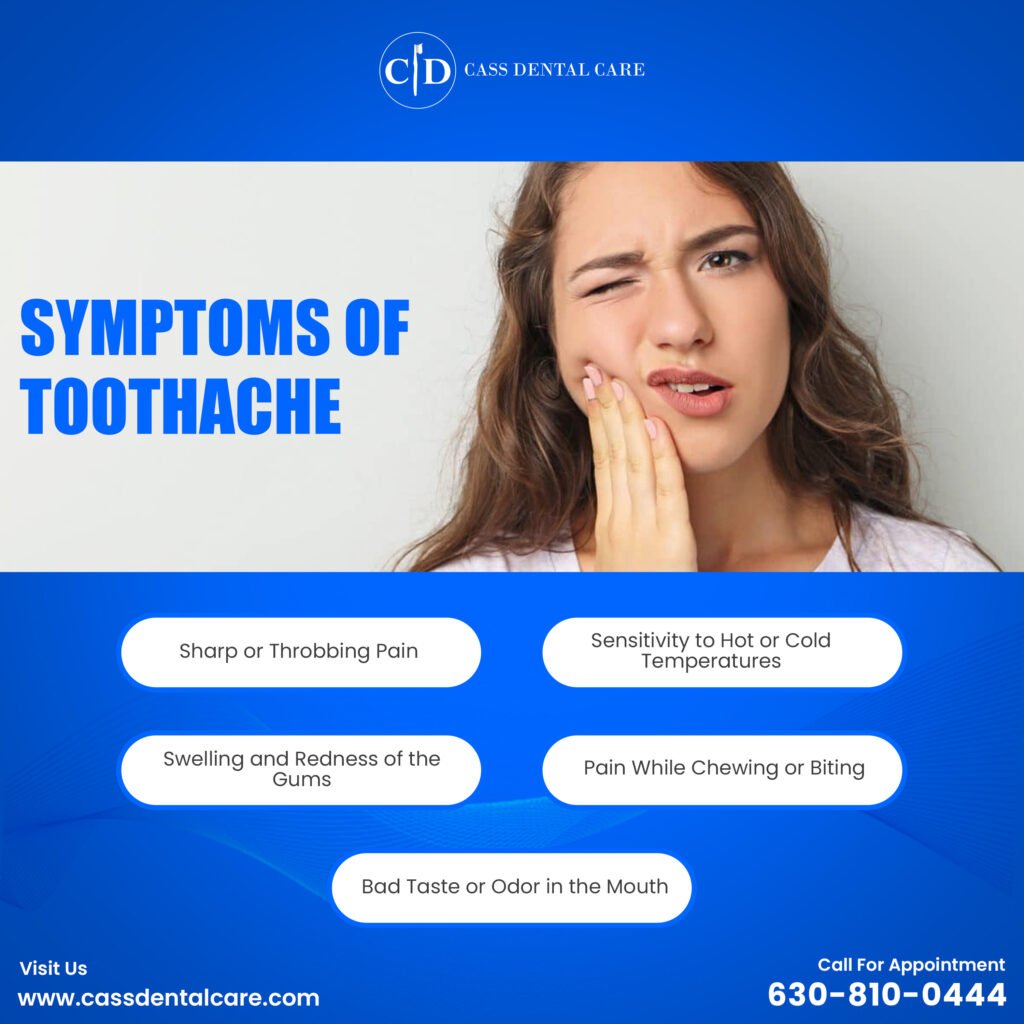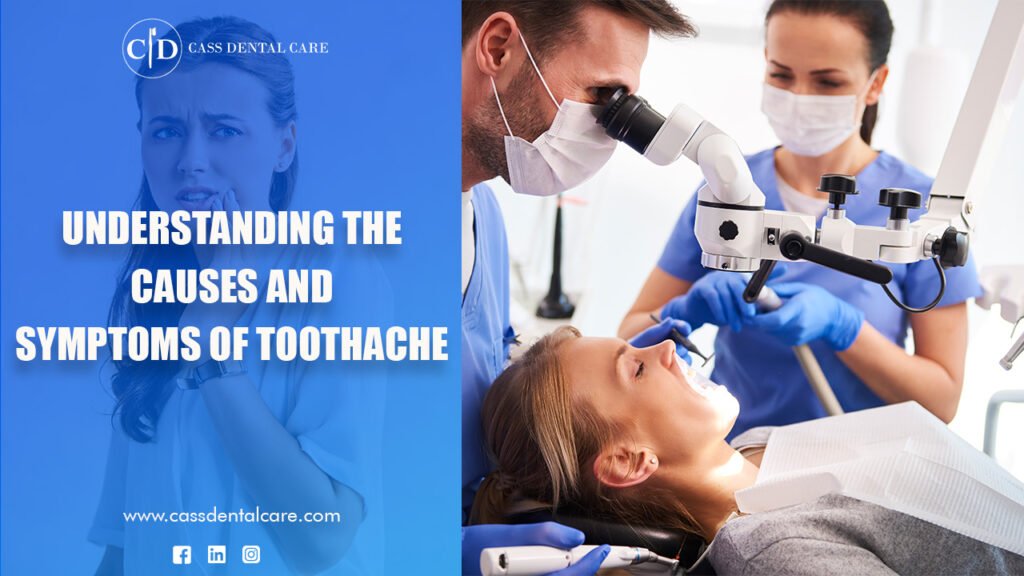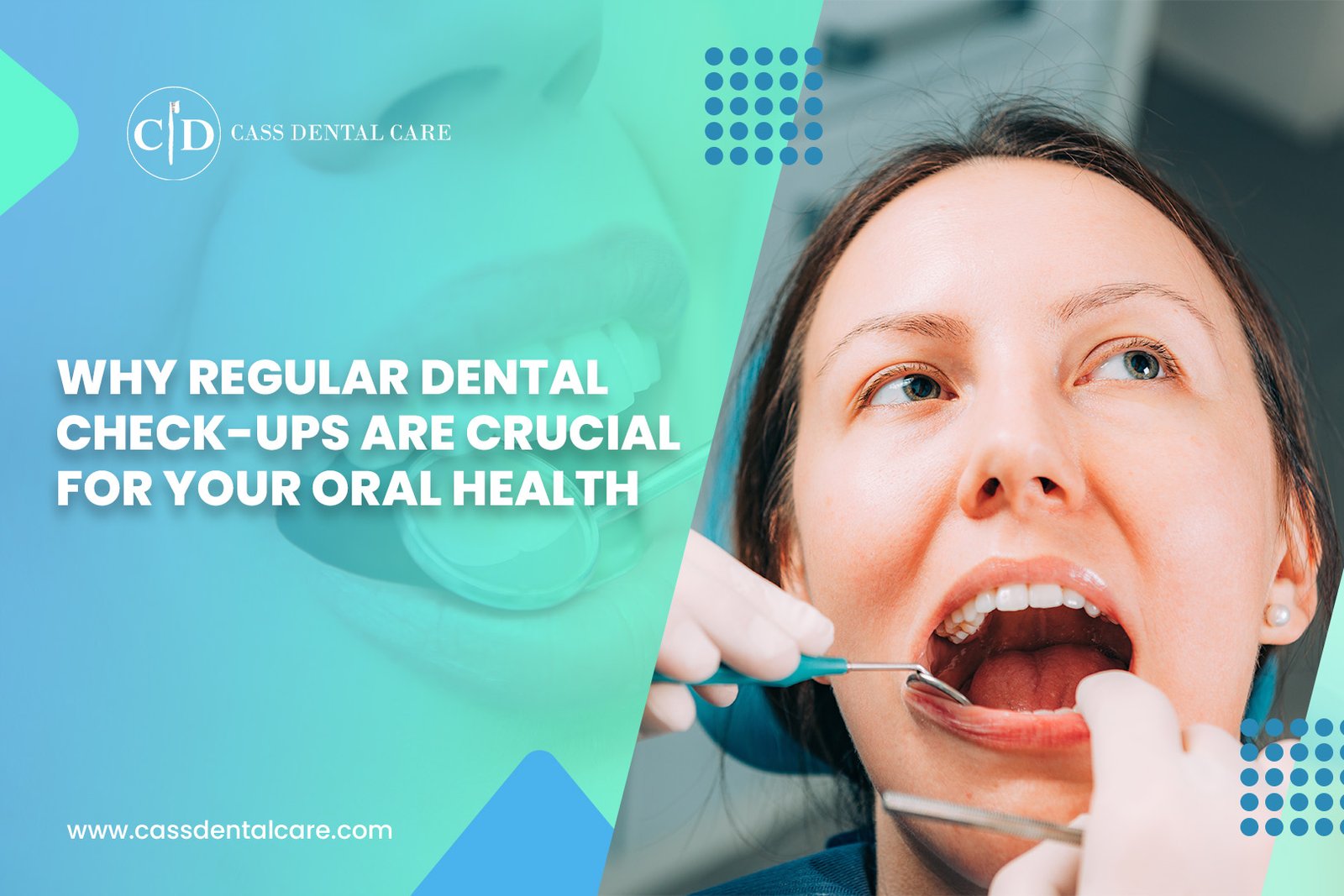Are you familiar with the feeling of excruciating pain shooting through your jaw, making even the simplest of tasks seem daunting? Or have you ever been jolted awake in the middle of the night, unable to escape the throbbing agony of a toothache? If you’ve experienced these discomforting moments, you’re certainly not alone. Toothaches, those seemingly small yet overwhelmingly painful nuisances, affect millions worldwide.
In this blog, we will embark on a journey to understand the causes and symptoms of toothache – an exploration that goes beyond the realm of discomfort. By delving into what leads to this distressing sensation and recognizing its warning signs, we gain relief and the power to prevent future dental woes. So, let’s dive into this essential knowledge, paving the way for healthier smiles and pain-free days ahead.
What Is a Toothache?
A toothache – those two words alone can send shivers down anyone’s spine. It’s that discomfort that can take the simplest pleasures, like enjoying a favorite ice cream or sipping on a hot cup of coffee, and turn them into excruciating experiences. But what exactly is a toothache?
Defining the Agony
A toothache is not just any pain; it’s a distressing sensation that originates within the teeth or the supporting structures in the mouth. It often feels like a sharp, throbbing, or constant pain ranging from mildly irritating to absolutely unbearable. This discomfort can extend to the surrounding areas of the face, jaw, and neck, making it difficult to concentrate on anything else. A toothache can be an unwelcome and all-encompassing intruder in your daily life, affecting everything from your eating and sleep patterns.
A Signal, Not the Problem
It’s crucial to understand that a toothache is not a standalone issue; instead, it’s often a symptom of an underlying dental problem. Your teeth are not meant to hurt – they are designed to help you chew, speak, and flash that beautiful smile. When they do damage, it’s your body’s way of alerting you to an issue that needs attention. This means toothache should never be ignored or masked with pain relievers. By recognizing it as a signal rather than the problem itself, you’re taking the first step towards alleviating the pain and addressing the root cause, ultimately ensuring your oral health and overall well-being.
So, the next time you find yourself wincing in pain because of a toothache, remember that it’s your body’s way of communicating with you, urging you to investigate and take action. Further in this blog, we will explore toothache’s various causes and symptoms, empowering you with the knowledge to decipher these signals and seek the appropriate dental care.
Common Causes of Toothache

Toothaches can be incredibly discomforting, and understanding their root causes is crucial for effective treatment and prevention. Several factors can lead to toothaches, each with its symptoms and characteristics. Let’s delve into some of the common culprits responsible for those dreaded toothaches:
Dental Decay (Cavities)
Dental decay, often called cavities or caries, is one of the most prevalent causes of toothaches. It occurs when bacteria in your mouth feed on sugary and starchy foods, producing acids that erode the enamel—the protective outer layer of your teeth. As the enamel wears away, the sensitive inner layers of your tooth are exposed, leading to sharp and often intermittent pain. Cavities can occur in any tooth and at any age.
Gum Disease
Gum disease, or periodontal disease, is another common cause of toothaches. It begins with the inflammation of the gums (gingivitis) and can progress to a more severe form called periodontitis if left untreated. Gum disease affects the gum tissue and can lead to toothache as it erodes the bone supporting your teeth. This can cause your teeth to become loose and sensitive, resulting in pain.
Tooth Sensitivity
Tooth sensitivity occurs when the protective enamel on your teeth is compromised, exposing the underlying dentin and nerve endings. This can happen due to enamel erosion, receding gums, or thinning enamel. Tooth sensitivity can lead to sharp, shooting pains, especially when consuming hot, cold, sweet, or acidic foods and beverages.
Tooth Fractures or Cracks
Accidents, injuries, or even biting down on complex objects can cause fractures or cracks in your teeth. These fractures can vary in severity, but even hairline attempts can lead to significant toothache, particularly when chewing or exposing the tooth to temperature extremes.
Dental Infections (Abscesses)
Dental infections, such as abscesses, can be excruciatingly painful. A spot is a pocket of pus that forms within the tooth or surrounding tissues due to bacterial infection. It often presents with severe, throbbing pain, swelling, and sometimes a bad taste or odor in the mouth. Dental conditions require immediate dental attention to prevent the spread of infection and alleviate the pain.
Impacted Wisdom Teeth
Wisdom teeth, known as third molars, typically erupt in late adolescence or early adulthood. However, these teeth often don’t have enough space to grow properly, leading to impaction. Impacted wisdom teeth can cause pressure, pain, and discomfort, especially in the back of the mouth.
Understanding these common causes of toothaches is the first step toward effective treatment and prevention. If you’re experiencing a toothache, it’s essential to consult a dentist promptly to identify the specific cause and determine the best course of action to relieve your pain and preserve your oral health. The following section will explore the various symptoms accompanying these dental issues, helping you recognize when to seek professional dental care.
Symptoms of Toothache

A toothache is an unwelcome visitor that can disrupt your daily life and make even the simplest activities seem daunting. Recognizing this dental discomfort’s various signs and symptoms is essential to understand and address toothaches effectively. Here are some typical indicators that you might be dealing with a toothache:
Sharp or Throbbing Pain
The hallmark of a toothache is often a sharp or throbbing pain originating from a specific tooth. This pain can range from mild and intermittent discomfort to severe, constant agony. Various factors may trigger it, such as temperature changes, pressure, or sweet foods.
Sensitivity to Hot or Cold Temperatures
Many people with toothaches experience heightened sensitivity to temperature extremes. It could be a sign of tooth sensitivity or an underlying dental issue if you wince when sipping on hot coffee or cringing from the cold sensation of ice cream.
Swelling and Redness of the Gums
Sometimes, a toothache can be accompanied by noticeable swelling and redness of the gums around the affected tooth. Swelling may indicate an infection or an abscess requiring immediate dental attention.
Pain While Chewing or Biting
Toothaches often become more pronounced when you pressure the affected tooth while chewing or biting. The discomfort may make eating difficult, especially if the toothache is severe.
Bad Taste or Odor in the Mouth
Dental infections, particularly abscesses, can lead to a foul taste or odor in the mouth. This unpleasant taste or smell often indicates a more serious dental issue that needs urgent attention.
It’s important to note that toothaches can vary in intensity and presentation, depending on the underlying cause. While these are common symptoms, you may experience a combination of additional signs. Regardless of your symptoms, a toothache signals something is amiss with your oral health and should not be ignored.
If you’re experiencing any of these symptoms, it’s advisable to consult a dentist promptly. Professional dental care can help identify the root cause of the toothache and provide appropriate treatment to alleviate your pain and prevent further complications. Understanding these symptoms is the first step towards taking control of your dental health and ensuring a brighter, pain-free smile.
When to Seek Professional Help
No matter how minor it may seem initially, a toothache should never be underestimated or left untreated. While some occasional tooth sensitivity or mild discomfort may subside on its own, persistent or severe toothaches require prompt attention from a dental professional like Dr. Neel Goyal. Understanding when to seek professional help is paramount for preserving your oral health and preventing more significant problems from arising.
The Importance of Consulting a Dentist
Consulting a dentist for persistent or severe toothaches is crucial for several reasons:
Identifying the Underlying Cause: Dentists have the expertise and tools to diagnose your toothache’s cause accurately. This is essential because the appropriate treatment depends on understanding whether the issue is due to dental decay, gum disease, a cracked tooth, or another underlying problem.
Preventing Progression: Ignoring a toothache can lead to the worsening of the underlying issue. What might start as a minor discomfort could escalate into a more severe dental problem that is more painful, challenging, and expensive to treat.
Pain Relief: Dentists can provide effective pain relief, which is often a top priority for those experiencing toothaches. They can prescribe pain medications or recommend appropriate dental procedures to alleviate your discomfort.
When to Seek Immediate Dental Care
Sure signs and symptoms associated with toothaches should prompt you to seek immediate dental care:
Signs of Infection: If you notice swelling, redness, or the formation of a bump on your gums near the painful tooth, it could indicate an infection or dental abscess. Dental infections can spread quickly and, in some cases, even become life-threatening. Seek immediate attention if you suspect an infection.
High Fever: A persistent, high fever accompanied by a toothache is a sign that the infection has spread beyond the tooth. This is a medical emergency; you should seek dental and medical care immediately.
Persistent and Severe Pain: If your toothache is exceptionally severe and doesn’t improve with over-the-counter pain relievers, something more serious might be at play. Don’t wait for the pain to worsen; consult a dentist as soon as possible.
Trauma or Injury: If your toothache results from a dental injury, such as a fall or blow to the face, it’s essential to see a dentist promptly. Trauma can cause damage that may not be immediately visible but can lead to significant problems if left untreated.
Difficulty Swallowing or Breathing: In rare cases, a severe dental infection can affect your ability to swallow or breathe. If you get these symptoms, it’s better to seek emergency medical attention immediately.
Understanding when to seek professional dental care is vital for maintaining oral health and preventing potentially serious complications. Early intervention can often lead to fewer problems and more effective treatments. Don’t let a toothache linger – take action promptly to ensure your smile stays healthy and pain-free.
Conclusion: Taking Care of Your Dental Health
In our journey through toothache causes and symptoms, we’ve learned valuable lessons:
- Toothaches are signals of dental issues, not just pain.
- Good dental hygiene and regular check-ups are vital.
- Act proactively to maintain your oral health.
Your smile is worth the effort. Keep brushing, see your dentist, and take charge of your oral well-being. A pain-free smile awaits! Book an appointment today at Cass Dental Care to maintain good dental hygiene.





